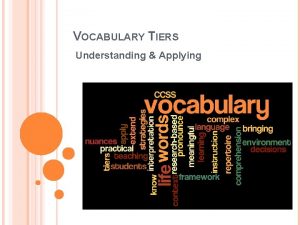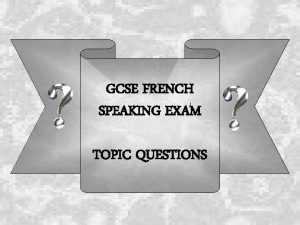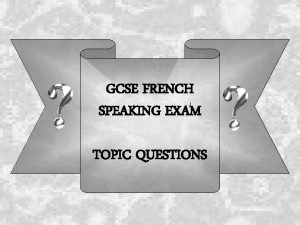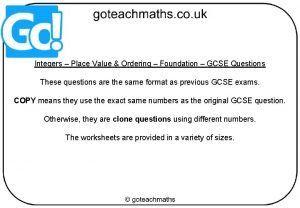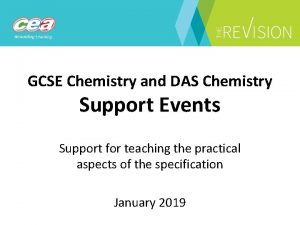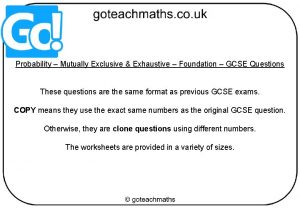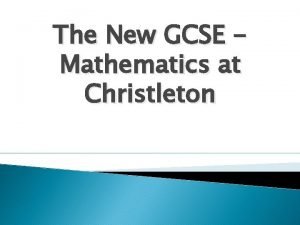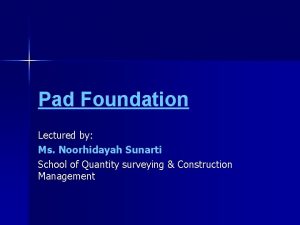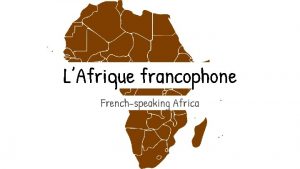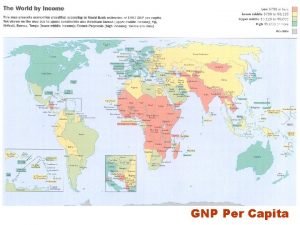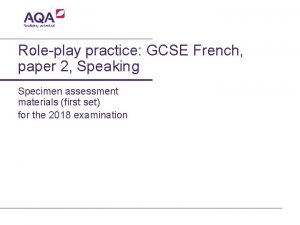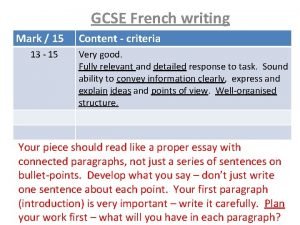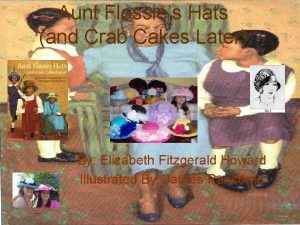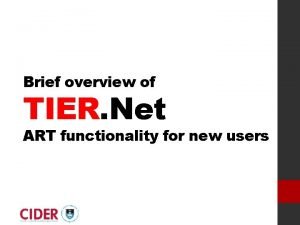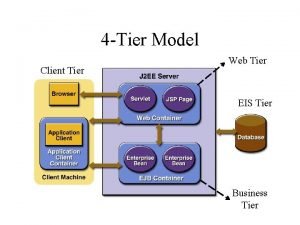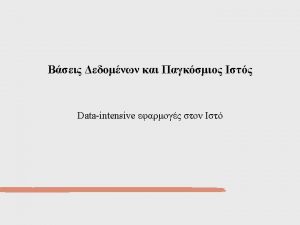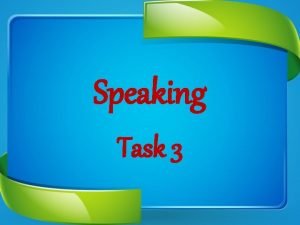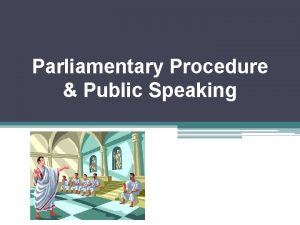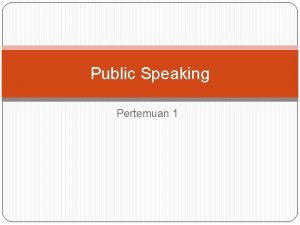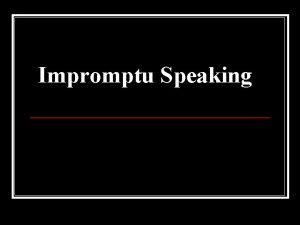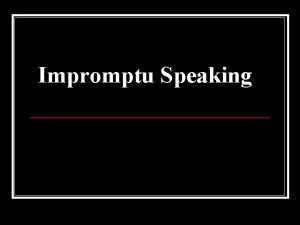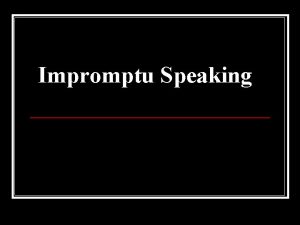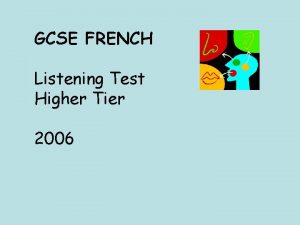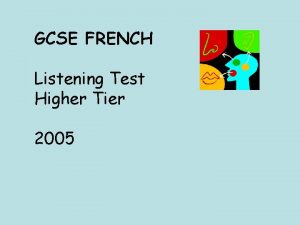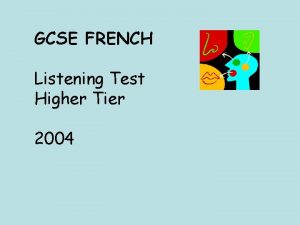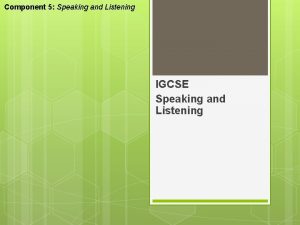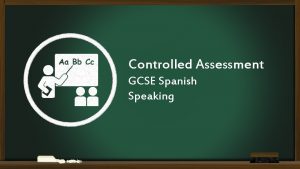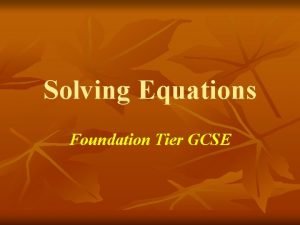GCSE FRENCH COMPONENT 1 SPEAKING FOUNDATION TIER 7

















- Slides: 17

GCSE FRENCH COMPONENT 1: SPEAKING FOUNDATION TIER 7– 9 minutes and 12 minutes preparation time INSTRUCTIONS TO CANDIDATES • The test will last 7 -9 minutes. You will have 12 minutes to prepare the role play and photo card discussion. • Role play: you should attempt to provide complete responses in the role play task. • Photo card discussion: you should attempt to provide extended responses to each of the questions asked. • Conversation: you may start the first part of the conversation with your nominated theme from one of the broad themes and your teacher will start the second part of the conversation with a different theme. • Complete the role play, the photo card discussion and the conversation.

INFORMATION FOR CANDIDATES Dictionaries are not allowed. • If you wish to, you may make notes on a single side of A 4 paper during the preparation time. • You may take these notes into the test to refer to during the test. • You must not write out complete and continuous sentences nor write on the task booklet. • The notes must be handed to your teacher at the end of the test. • The role play and photo card discussion carry 15 marks each. • The conversation carries 30 marks. • A total of 15 marks will be awarded for knowledge of, and accurate application of grammar and structures in the assessment (5 in the photo card discussion and 10 in the conversation task). GCSE FRENCH COMPONENT 1: SPEAKING SET 3 FOUNDATION TIER 7– 9 minutes and 12 minutes preparation time

ROLE PLAY Instructions to candidate ? means that you will have to ask a question ! means that you will have to respond to an unexpected question Sub-theme: Lifestyle Scénario : Tu parles avec ton ami(e) français(e) au sujet de la santé. Ton professeur est ton ami(e) et parle le premier/la première. Sports (deux activités) Sports – où Petit déjeuner – ce matin (un détail) ? Le déjeuner !

PHOTO CARD DISCUSSION Sub-theme: Current study • Décris cette photo • Quelle matière détestes – tu ? Pourquoi ?

CONVERSATION Part 1 Candidate's nominated theme Part 2 Current and future study and employment (3) OR (to be used if the candidate has covered the above theme in Part 1) Local, national, international and global areas of interest (2)

Role play: Teacher examiner's prompts: Qu’est-ce que tu fais comme sport ? Sports (deux activités) Où fais-tu du sport ? Sports – où Qu’est-ce que tu as pris pour le petit déjeuner ce matin ? Petit déjeuner – ce matin (un détail) Reply appropriately ? Le déjeuner Reply appropriately. Aimes-tu le fastfood et pourquoi ? !

Role play: Teacher examiner's additional questions: J’adore lire. Est-ce que tu aimes lire ? Pourquoi ? La semaine dernière, qu’estce que tu as fait au collège ?

Role play – suggested answers 1 Je joue au football et je fais de la natation. 2 Je vais au centre sportif. 3 J’ai mangé des croissants/j’ai bu un thé : Must be past tense 4 Qu’est-ce que tu aimes manger pour le déjeuner ? 5 Oui j’aime le fastfood parce que c’est rapide. Non je n’aime pas le fastfood parce que ce n’est pas bon pour la santé.

Communication and interaction Each response by the candidate will be given 3, 2, 1, or 0 marks on the following basis: Foundation tier 3 Message is conveyed. Vocabulary and grammatical structures are mostly correct. Pronunciation and intonation are mostly accurate, may have occasional lapses. 2 Message is conveyed, though there may be some ambiguity, or message is partially conveyed without ambiguity. Vocabulary and grammatical structures contain frequent errors. Pronunciation and intonation are more accurate than inaccurate. 1 Message is partially conveyed, but is ambiguous. Limited knowledge of vocabulary or grammatical structures demonstrated. Lapses in pronunciation and intonation may impede communication. 0 Inappropriate or no response. None of the required information is communicated.

Leisure This Power. Point presentation gives you the basic, Foundation Tier answers to the questions about LEISURE. In order to score more highly (Grade C or above) you need to extend each answer. Add an opinion Say where, who with, when, why, how …. In fact, add anything that is relevant to the question

Leisure 1: Qu’est-ce que tu aimes comme musique? (What kind of music do you like ? ) J’aime / J’adore écouter du (TYPE OF MUSIC) I like / I love to listen to (TYPE OF MUSIC e. g. rock/pop) Mon groupe préférée s’appelle…. My favourite group is called….

Leisure 2: Qu’est-ce que tu aimes faire pendant ton temps libre? (What do you like to do in your free time ? ) Pendant mon temps libre, j’aime (HOBBY). Some hobbies coming up….

Hobbies Écouter de la musique Regarder la télé aller au cinéma Danser faire du vélo Jouer de la guitare Lire Jouer au foot Sortir avec mes copains Aller en ville Faire su shopping Jouer à l’ordinateur

Leisure 3: Qu’est-ce que tu as fait pendant les vacances de Noel ? (What did you do during the Christmas holidays ? ) Pendant les vacances de Noel, j’ai … (ACTIVITIES)

Leisure 4: Qu’est-ce que tu feras pour t’amuser le weekend prochain ? (What will you do to have fun next weekend? ) Le weekend prochain, je vais (INFINITIVE)

Leisure 5: Qu’est-ce que tu aimes regarder à la télé ? (What do you like to watch on TV ? ) J’aime bien regarder (TYPE OF PROGRAMME) par exemple (E. G. ) et aussi j’aime (TYPE OF PROGRAMME). Je n’aime pas (TYPE OF PROGRAMME)

Types of TV programme Les feuilletons Les films Les émissions de sport La science-fiction Les émissions de musique Les jeux télévisés Les dessins animés Les informations Les documentaires Les publicités (soaps) (films) (sport) (sci-fi) (music) (quiz) (cartoons) (news) (documentaries) (adverts)
 Tier 1 2 3 vocabulary words
Tier 1 2 3 vocabulary words Tier ii words
Tier ii words Gcse french speaking questions
Gcse french speaking questions Gcse french speaking questions
Gcse french speaking questions Place value gcse
Place value gcse Grade boundaries 2021
Grade boundaries 2021 Trigonometry foundation questions
Trigonometry foundation questions Probability foundation gcse questions
Probability foundation gcse questions Https://vle.mathswatch.co.uk/vle/
Https://vle.mathswatch.co.uk/vle/ Composition of urine
Composition of urine Pile foundation details
Pile foundation details How many countries in africa speak french
How many countries in africa speak french French speaking places in the world
French speaking places in the world Role play french gcse
Role play french gcse French connectives gcse
French connectives gcse Flossies kitten rescue
Flossies kitten rescue Tier net
Tier net Three tier approach
Three tier approach
